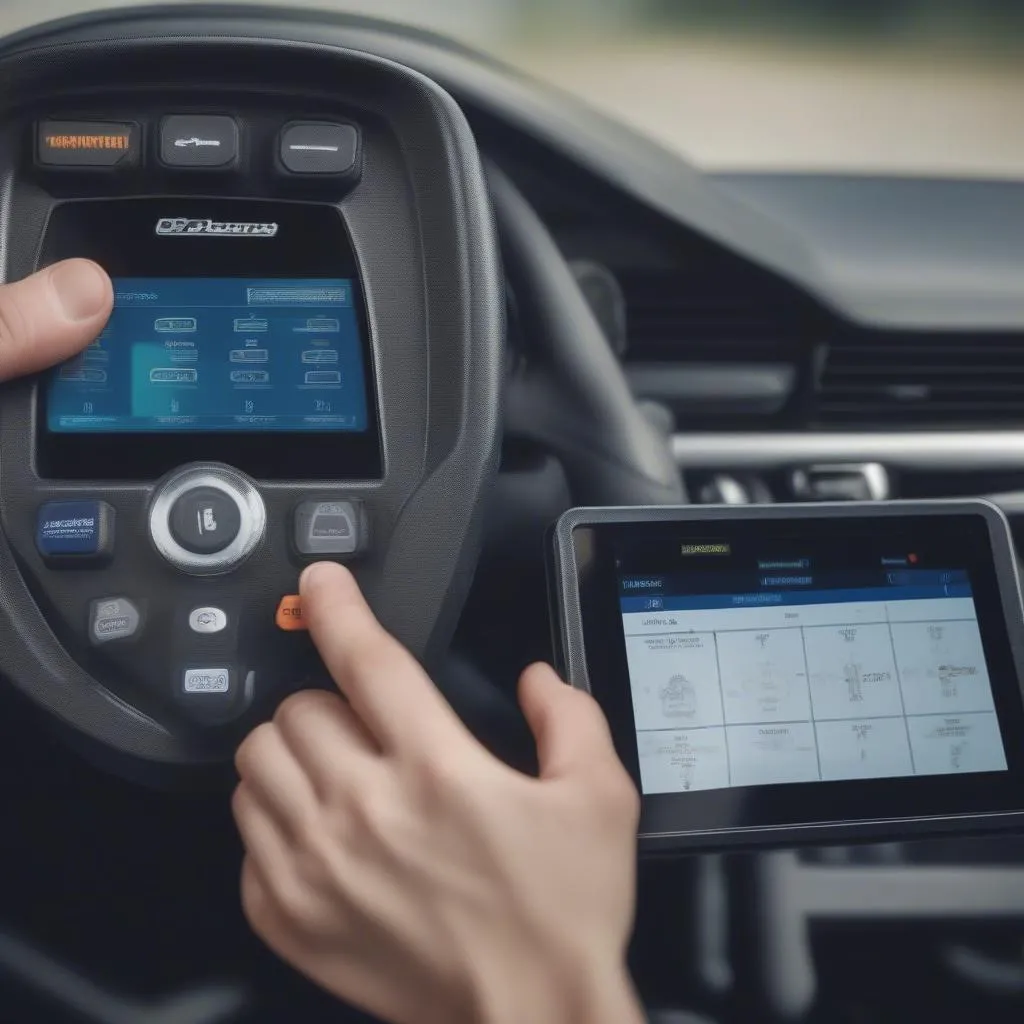Have you ever wondered what’s going on under the hood of your car? Or maybe you’ve experienced a check engine light that just won’t go away. If so, you’re not alone! Millions of car owners have been in the same boat, and the good news is there’s a simple solution: an OBD2 scanner.
What is an OBD2 Scanner?
An OBD2 scanner is a diagnostic tool that connects to your car’s onboard diagnostics (OBD) system. It allows you to access real-time data about your vehicle’s performance, identify potential problems, and even reset warning lights.
Why is OBD2 So Important?
For mechanics, OBD2 scanners are indispensable tools. They allow them to quickly and accurately diagnose problems, saving time and money. For car owners, OBD2 scanners can empower you to understand your vehicle better and potentially save money on costly repairs. Imagine being able to diagnose a simple issue yourself, instead of having to rely on a mechanic.
Understanding the Basics
OBD2 stands for On-Board Diagnostics, version 2. It’s a standard adopted by the US Environmental Protection Agency (EPA) in 1996, and it’s now required on all vehicles sold in the United States and many other countries. This means that any car manufactured after 1996 (or later, depending on the country) should have an OBD2 connector located under the dashboard.
How OBD2 Scanners Work
OBD2 scanners work by reading and interpreting data from your vehicle’s onboard diagnostics system. This system is constantly monitoring your car’s various systems, including the engine, transmission, and emissions control. When a problem is detected, the system stores a diagnostic trouble code (DTC).
How to Use an OBD2 Scanner
Using an OBD2 scanner is relatively simple. Connect the scanner to your car’s OBD2 port, turn the key to the “ON” position, and select the desired function. Most scanners have an easy-to-use interface that guides you through the process.
Types of OBD2 Scanners
There are various types of OBD2 scanners available, each with its own set of features and capabilities. Here’s a quick overview:
Basic OBD2 Scanners: These are the most affordable and basic type of scanner. They primarily read and clear trouble codes, providing you with a basic understanding of your car’s health.
Advanced OBD2 Scanners: These scanners offer more features, such as live data readings, graphing, and even the ability to perform basic diagnostics on specific systems.
Dealer-Level Scanners: These high-end scanners are typically used by professional mechanics and dealers. They offer the most advanced features and can access all of your car’s diagnostic information.
Plug-In OBD2 Scanners: These scanners are compact and easy to use, but they usually have limited capabilities.
WiFi OBD2 Scanners: These scanners allow you to connect to your vehicle’s diagnostics wirelessly, enabling you to monitor your car’s performance remotely.
For European Cars: If you own a European car, it’s important to use a scanner that is compatible with your vehicle’s specific protocol. Some OBD2 scanners are specifically designed for European cars and offer additional features, such as reading and clearing codes for various European car brands.
Common OBD2 Scanner Questions
What kind of OBD2 scanner do I need?
The best type of scanner for you will depend on your needs and budget. If you’re just looking to read and clear trouble codes, a basic scanner will suffice. If you want to monitor live data or perform more advanced diagnostics, you’ll need an advanced scanner.
Can I use an OBD2 scanner on any car?
OBD2 scanners are compatible with most cars manufactured after 1996. However, some older or imported vehicles may have different connectors or protocols, so it’s important to check the compatibility of the scanner before purchasing.
Can I use an OBD2 scanner to clear my check engine light?
Yes, most OBD2 scanners can clear check engine lights. However, it’s important to note that clearing the light doesn’t necessarily mean that the underlying problem has been solved. It’s always a good idea to address the problem to prevent further damage to your vehicle.
Is it safe to use an OBD2 scanner on my car?
OBD2 scanners are generally safe to use on your car. However, it’s important to make sure that you use a reputable scanner and follow the manufacturer’s instructions.
Where can I buy an OBD2 scanner?
OBD2 scanners can be purchased from a variety of online retailers, auto parts stores, and even some gas stations.
Can I use an OBD2 scanner to improve my car’s performance?
While some OBD2 scanners can monitor performance data, they can’t directly improve your car’s performance. However, they can help you identify potential problems that are affecting performance.
Can I use an OBD2 scanner to tune my car’s engine?
No, OBD2 scanners can’t be used to tune your car’s engine. You’ll need a dedicated engine tuning tool for that purpose.
OBD2 Scanners: A Tool for Every Car Owner
OBD2 scanners have become a valuable tool for both mechanics and car owners alike. They provide a window into your vehicle’s health, allowing you to identify potential problems early on and save money on costly repairs. Whether you’re a seasoned mechanic or a first-time car owner, an OBD2 scanner can be a wise investment for your vehicle.
Don’t hesitate to contact us at Whatsapp: +84767531508 if you need help with your car’s diagnostic tools. We’re available 24/7 to provide expert advice and assistance.
Have you ever used an OBD2 scanner? Share your experiences in the comments below!
Check out these related articles:



